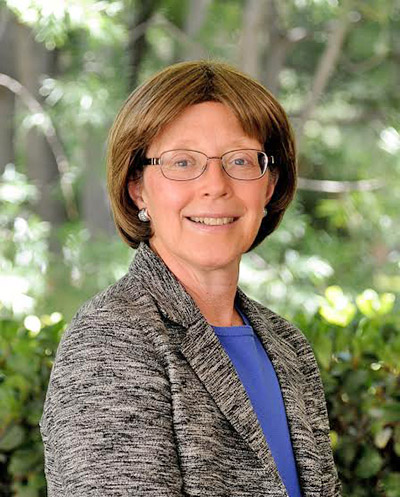Karukstis Receives ACS Award
September 13, 2019
The American Chemical Society has awarded Kerry Karukstis, Ray and Mary Ingwersen Professor of Chemistry, with the 2020 ACS Award for Research at an Undergraduate Institution. Sponsored by the Research Corporation for Science Advancement, the award recognizes the importance of research with undergraduates and honors a chemistry faculty member whose research in an undergraduate setting has achieved wide recognition and contributed significantly to chemistry and to the professional development of undergraduate students.
The award recognizes Karukstis’ participation as an undergraduate research mentor and proponent of the teacher-scholar model at Harvey Mudd since 1984 and her active engagement in the undergraduate research enterprise at the national level through her involvement with the Council on Undergraduate Research (CUR) since 1993. Karukstis says, “Both of these activities have been passions of mine. I have found undergraduate research to be a compelling way to meld the interests of faculty to engage in scholarly work with the needs of students for challenging experiences that lead to substantial impacts on their professional development.”
“Kerry has been a mentor in research, careers and achieving work-life balance for many Harvey Mudd College students, both within the chemistry program and across the College,” says Hal Van Ryswyk, John Stauffer Professor of Chemistry and department chair. “From day one, the chemistry faculty of Harvey Mudd College have believed that research on a significant chemical problem is a particularly valuable educational experience. This model has since become the norm at quality undergraduate institutions. To make this model work, a faculty member needs vision, ability, dedication and some measure of institutional support. In addition to having a nationally recognized research program in her lab, Kerry has been instrumental in nurturing this model at other institutions and helping to create frameworks in support of teacher-scholars. We are proud of what she has accomplished!”
The citation for Karukstis’ award reads: “In recognition of her research accomplishments, mentorship and professional training of undergraduates, advancement strategies for women STEM faculty and national efforts to promote undergraduate research.”
Karukstis, who joined the HMC faculty in 1984, is a strong proponent of the teacher-scholar model for faculty and the practice of student-faculty collaborative research. Karukstis has conducted student-faculty collaborative research with external funding provided by the National Science Foundation, the National Institutes of Health, the American Chemical Society Petroleum Research Fund, Research Corporation, the Camille and Henry Dreyfus Foundation and the Jonsson Foundation.
“In my National Science Foundation work with CUR and fellow PIs, we have assisted over 200 institutions across the country in the process of institutionalizing undergraduate research, scaffolding the elements of undergraduate research throughout the curriculum, and understanding the factors necessary for transformative organizational and cultural change. The work has been both collaborative and rewarding,” she says.
For Karukstis, a benefit of her long career is being able to see the results of her mentorship with students. Of the 121 undergraduate research students Karukstis has mentored to date (64% female), including 52 senior thesis students (62% female), 65% have earned a PhD in chemistry and 90% have earned advanced degrees.
“There is no question that undergraduates have propelled my research program forward,” Karukstis says. “Their enthusiasm, creativity, technical expertise and eagerness to try new and challenging approaches have been key to our success. A number of years ago because of my students’ mathematical background and willingness to use a Fortran program to carry out tedious three-mode factor analyses, we pioneered a novel and sensitive spectroscopic technique to characterize the complex three-dimensional structures of self-assemblies of amphiphilic molecules. Our research and the work of many others have benefitted from this approach.”
Karukstis has also used this spectroscopic approach to efficiently construct binary surfactant-water phase diagrams that correct thermodynamically inaccurate representations in the literature.
The ACS award includes $5,000, and the College will receive a Research Corporation grant of $5,000. Though no specifics have been determined yet, Karukstis says the funds will be used to support undergraduate research in the chemistry department.
Karukstis joins an elite class of honorees, one per year from around the nation, including Harvey Mudd Professors of Chemistry Emeritus Phil Myhre (1991) and Mits Kubota (1992). She looks forward to celebrating the award with her peers at the ACS National Meeting and Expo in March.
“I am deeply grateful to my undergraduate research students over the years and the opportunities that I have had to be a part of the undergraduate research community,” she says.
